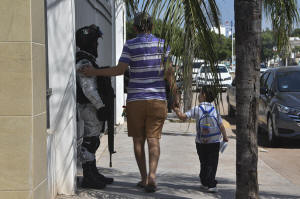In the heartland of Mexico's Sinaloa cartel, the old ways have changed
and violence rages
 Send a link to a friend
Send a link to a friend
 [October 16, 2024]
By MARK STEVENSON [October 16, 2024]
By MARK STEVENSON
MEXICO CITY (AP) — Cellphone chats have become death sentences in the
continuing, bloody factional war inside Mexico's Sinaloa drug cartel.
Cartel gunmen stop youths on the street or in their cars and demand
their phones. If they find a contact who’s a member of a rival faction,
a chat with a wrong word or a photo with the wrong person, the phone
owner is dead.
Then, they’ll go after everyone on that person's contact list, forming a
potential chain of kidnapping, torture and death. That has left
residents of Culiacan, the capital of Sinaloa state, afraid to even
leave home at night, much less visit towns a few miles away where many
have weekend retreats.
“You can’t go five minutes out of the city, ... not even in daylight,”
said Ismael Bojórquez, a veteran journalist in Culiacan. “Why? Because
the narcos have set up roadblocks and they stop you and search through
your cellphone.”
And it’s not just your own chats: If a person is traveling in a car with
others, one bad contact or chat can get the whole group kidnapped.
That’s what happened to the son of a local news photographer. The
20-year-old was stopped with two other youths and something was found on
one of their phones; all three disappeared. Calls were made and the
photographer’s son was finally released, but the other two were never
seen again.

Residents of Culiacan had long been accustomed to a day or two of
violence once in a while. The presence of the Sinaloa cartel is woven
into everyday life there, and people knew to stay indoors when they saw
the convoys of double-cab pickups racing through the streets.
But never have they seen the solid month of fighting that broke out
Sept. 9 between factions of the Sinaloa cartel after drug lords Ismael
“El Mayo” Zambada and Joaquín Guzmán López were apprehended in the
United States after flying there in a small plane on July 25.
Zambada later claimed he was kidnapped and forced aboard the plane by
Guzmán López, causing a violent battle between Zambada’s faction and the
“Chapitos” group led by the sons of imprisoned drug lord Joaquin “El
Chapo” Guzmán.
Residents of Culiacan are mourning their old lives, when the wheels of
the local economy were greased by cartel wealth but civilians seldom
suffered — unless they cut off the wrong pickup truck in traffic.
Juan Carlos Ayala, an academic who studies the anthropology of the drug
trade at the Autonomous University of Sinaloa, said that following the
arrests of Guzmán López and Zambada in July, a new generation of
younger, more flashy and cosmopolitan drug lords have taken over.
They fight with extreme violence, kidnapping and cellphone tracking —
not the old kind of handshake deals their elders used alongside
shootouts to settle matters.
“There is a new generation of leaders of drugs and organized crime here,
that has other strategies,” Ayala said. “They see that the tactic of
shootouts hasn’t worked for them, so they go for kidnapping.”
“They catch one person, and he has messages from the rival group,” said
Ayala. “So they go after him to squeeze more information, and that
starts a chain of hunting, to catch the enemy.”
The new tactics are reflected in the huge wave of armed carjackings in
and around Culiacan. Cartel gunmen used to steal the SUVs and pickups
they favor for use in cartel convoys; but now they focus on stealing
smaller sedans.
They use these to go undetected in their silent, deadly kidnappings.
Often, the first a driver knows is when a passing car tosses out a spray
of bent nails to puncture his tires. Vehicles pull up front and rear to
cut him off. The driver is bundled into another car. All that is left
for neighbors to find is a car with burst tires, the doors open, the
engine running, in the middle of the street.

[to top of second column]
|

A resident pats a National Guard on the arm after picking a child up
from school in Culiacan, Sinaloa state, Mexico, Monday, Oct. 14,
2024. (AP Photo)

The State Council on Public Safety, a civic group, estimates that in
the past month there have been an average of six killings and seven
disappearances or kidnappings in and around the city every day. The
group said about 200 families have fled their homes in outlying
communities because of the violence.
Culiacan is no stranger to violence — shooting broke out across the
city in October 2019 when soldiers mounted a failed attempt to
arrest another of Chapo Guzmán’s sons, Ovidio. Fourteen people were
killed that day.
A few days later, civic activist Estefanía López arranged a peace
march and 4,000 residents turned out for it. When she tried to do
something similar this year, she could get only about 1,500 people
to attend a similar demonstration.
“We got a lot of messages beforehand from a lot of people who said
they wanted to join and march, to support the cause, but who were
afraid to come,” López said.
There’s reason to be afraid: Last week, gunmen burst into a Culiacan
hospital to kill a patient previously wounded by gunshots. In a town
north of Culiacan, drivers were astonished to see a military
helicopter seeking to corral four gunmen in helmets and tactical
vests just yards from a highway; the gunmen were shooting back at
the chopper.
The government’s response to all this has been to blame the United
States for stirring up trouble by allowing the drug lords to turn
themselves in, and to send in hundreds of army troops.
But irregular urban combat in the heart of a city of 1 million
inhabitants — against a cartel that has lots of .50-caliber sniper
rifles and machine guns — is not the army’s specialty.
Squads of soldiers went into a luxury apartment complex in the
city’s center to detain a suspect and they wound up shooting to
death a young lawyer who was merely a bystander.
López, the peace activist, has been asking for soldiers and police
to be posted outside schools, so children can return to classes —
most are currently taking classes online because their parents judge
it too dangerous to take them to school.
But police can’t solve the problem: Culiacan’s entire municipal
force has been temporarily disarmed by soldiers to check their guns,
something that’s been done in the past when the army suspects
policemen are working for drug cartels.
The local army commander recently acknowledged that it's up to the
cartel factions — not authorities — when the violence will stop.

“In Culiacan, there is not even faith anymore that we will be safe,
with police or soldiers,” López said, noting that that has had a
clear effect on daily life and the economy. “A lot of businesses,
restaurants and nightclubs have been closed for the past month.”
Laura Guzmán, the leader of the local restaurant chamber, said about
180 businesses in Culiacan have closed, permanently or temporarily,
since Sept. 9 and almost 2,000 jobs have been lost.
Local businesses tried to organize evening “tardeadas” — long
afternoons — for residents who were afraid to go out after dark, but
they didn’t draw enough customers.
“Young people are not interested in going out right now,” Guzmán
said.
For those looking to get away from the violence temporarily, the
seaside resort of Mazatlan used to be only 2½ hours away by car. But
that’s not an option since last month when cartel gunmen hijacked
passenger buses, forced the tourists off and burned the vehicles to
block the road to Mazatlan.
That leaves just one option, and one only open to some.
“Those who have the economic resources get out of the city by
airplane to take a break,” Guzmán said.
All contents © copyright 2024 Associated Press. All rights reserved |